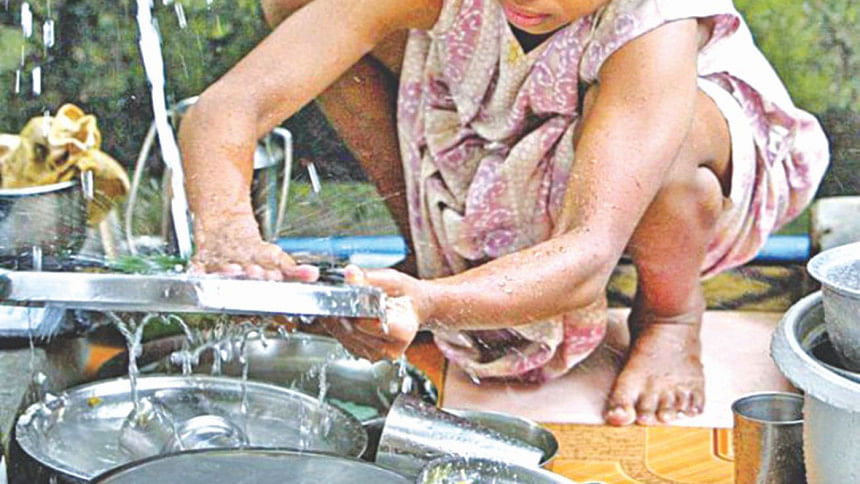Your Advocate

This week Your Advocate is Barrister Omar Khan Joy, Advocate, Supreme Court of Bangladesh. He is the head of the chambers of a renowned law firm, namely, 'Legal Counsel', which has expertise mainly in commercial law, corporate law, family law, employment and labor law, land law, banking law, constitutional law, criminal law, IPR and in conducting litigations before courts of different hierarchies.
Query
I live in Dhaka with my family. We have a domestic aide who is 15 years old. She used to live in our village with her parents but they suddenly died in 2014 by a road accident. After their death, she lived with her uncle. Last year, my parents brought her to our house. With my persuasion, my parents admitted her to a school run by Jaago Foundation. I have a query to know that whether we are violating any law by engaging her to work. I would also like to know about her legal rights and our responsibilities.
Sabrina, Dhaka
Response
I am very delighted to know that you have arranged for the education of the girl working at your house and want to ensure that she enjoys all the rights that she is legally entitled. You certainly deserve appreciation for that.
Employments in Bangladesh are largely regulated by the Bangladesh Labour Act 2006. But, this Act excludes domestic aids from its scope and application. In the absence of any formal recognition, domestic aids suffer from different types of exploitation, e.g. longer working hours, verbal and physical abuse, etc. With regard to the absence of a uniform law for domestic workers, Bangladesh is not an exception. International Labour Organisation (ILO) conducted a study in 2013 and finds that only 10% of domestic aides in the world receive protection from general labour laws, while another 30% are excluded from the scope of any labour laws.
The government has realised the importance of enacting a law for them and thus, adopted a policy titled the Domestic Aide Protection and Welfare Policy 2015 to safeguard their rights. A Policy is not binding on the citizens of a country as a Parliamentary Act is. However, we need to follow the principles laid down in the Policy until an Act is passed for the protection of the domestic aids.
For your reference, I would like to give you a brief overview of the Policy and I believe you will get a clear picture of your responsibility towards her.
The Policy highlights in details the recognition of the domestic aides' jobs as 'labour' ensuring their protection, welfare, leisure, entertainment, leaves and congenial and decent working environment.
Minimum age of the domestic aide is 14 years for light works and a domestic aide only above 18 years would be eligible for heavy works. The employers have to ensure a full-time/part-time domestic aide's salaries and other allowances. Any clothing or other forms of support have to be excluded from the salary arrangement. The salaries of domestic aides would be determined upon mutual agreement between the employer and the domestic aide.
To appoint a domestic aide below 18 years old, the employer shall negotiate the terms with legal guardian of the domestic aide. The employer shall negotiate with the presence of a third party witness if the contract is an oral one. The arrangement shall include responsibilities, date of appointment, preoccupation, leaves and breaks, accommodation, diet and clothing allowance. If the domestic aide is an adult, it is reasonable to discuss with him/her before appointment.
Any kind of indecent behaviour, physical, sexual or mental torture is strictly prohibited. The government will take full responsibility for any cases filed over harassment and/or violence under the existing penal laws.
The employer can terminate the contract and take legal action if the domestic aide causes harassment, physical or mental violence on children, ill or old people of the employer's family. The employer can now file general diary with local police if the domestic aide leaves without any notice and can also take legal measures if he/she flees after stealing money or properties.
As per the Policy, the government will introduce a 'helpline' for domestic aides and also an awareness campaign. The Ministry of Labour and Employment is creating a monitoring cell to implement the Policy. You can also read the full Policy from the link provided here: http://www.mole.gov.bd/site/view/policies. I would be very glad if my above reply could assist you to meet your queries.
For detailed query contact: [email protected].

 For all latest news, follow The Daily Star's Google News channel.
For all latest news, follow The Daily Star's Google News channel. 



Comments